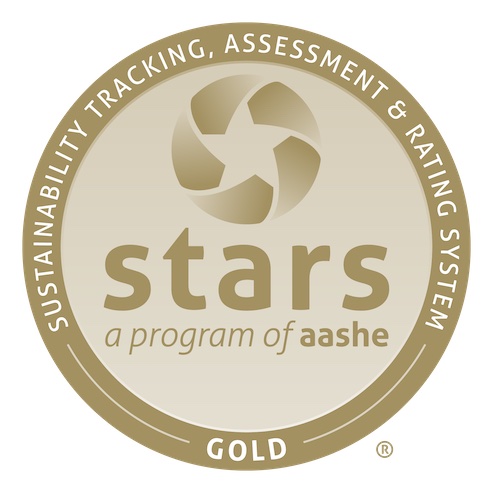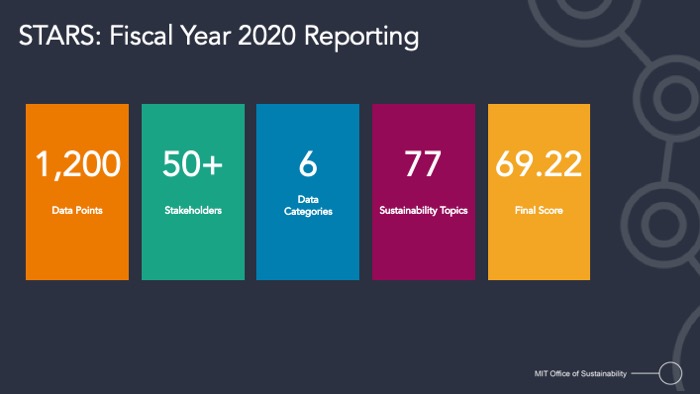
MIT earns Gold in the Sustainability Tracking, Assessment & Rating System (STARS)
 MIT earned a STARS Gold rating, for the second time, in recognition of sustainability and climate action achievements from the Association for the Advancement of Sustainability in Higher Education (AASHE). STARS, the Sustainability Tracking, Assessment & Rating System, measures sustainability in all aspects of higher education, facilitating information sharing across institutions. Collaboration and teamwork across the Institute were critical to the data collection effort needed to submit the STARS report. MIT Office of Sustainability led the effort, connecting over 50 campus stakeholders. Together this group compiled 1,200 data points in six data categories and 77 sustainability topics.
MIT earned a STARS Gold rating, for the second time, in recognition of sustainability and climate action achievements from the Association for the Advancement of Sustainability in Higher Education (AASHE). STARS, the Sustainability Tracking, Assessment & Rating System, measures sustainability in all aspects of higher education, facilitating information sharing across institutions. Collaboration and teamwork across the Institute were critical to the data collection effort needed to submit the STARS report. MIT Office of Sustainability led the effort, connecting over 50 campus stakeholders. Together this group compiled 1,200 data points in six data categories and 77 sustainability topics.
The data categories in the report are defined as: Academics, Engagement, Operations, Planning & Administration, and Innovation & Leadership. The report encompasses the complete spectrum of community sustainability. It not only includes metrics typically associated with the environment—such as building energy, waste, and water—but also reaches into the social impacts of the Institute. An example of the broad reach includes information on MIT”s Diversity, Equity, and Inclusion Action Plan, a structured assessment to improve diversity, equity, and inclusion on campus. STARS also rates the progress towards greater affordability and access for low-income students.
MIT last submitted an assessment in 2018, also gaining enough points to earn a Gold rating. Reflecting substantial new efforts and progress, the total number of points across multiple categories and topics increased in the 2021 report. Curriculum, research, planning, well-being, climate, food, waste, and water categories earned quantitative improvements in the report.
The Gold rating places MIT among its peers, such as Yale, Columbia, and the University of Pennsylvania. Julie Newman, Director of Sustainability, reflected, “By comparing our fiscal year 2017 and 2020 data, we’ve gained insight into the progress we have made and developed an understanding of the opportunities for growth and improvement. MIT remains deeply committed to building a better world and solving for the global challenges of today and tomorrow.”
Looking Forward: New Carbon Reduction Goals
Since the publication of Fast Forward: MIT’s Climate Action Plan for the Decade in May 2021, the MIT Office of the Executive Vice President and Treasurer now has a new set of campus climate commitments and metrics to inform and implement. The two ambitious greenhouse gas reduction targets are net-zero campus by 2026 and the elimination of direct campus emissions by 2050. The establishment of and progress towards these goals will be reflected in future STARS reports and available, often in real-time, via the Sustainability Datapool. These transparent data collection and reporting projects support the community to use the campus as a testbed to generate innovative new solutions. Joe Higgins, vice president for Campus Services and Stewardship, notes, “By pursuing innovative partnership models and novel ways to reduce our campus carbon footprint, we hope to inspire others to push the boundaries as well."
Projects range from Transportation to Academic Courses
MIT’s distinctive and collaborative programs support achievement across STARS categories and institutional silos. Access MIT is an engagement initiative that significantly reduced parking demand and the associated operational and environmental impacts. Employee benefits and policy efforts such as pay-per-day parking and zero-cost access to MBTA services increased well-being and equity.
Illustrating the impact of these and other academic efforts, STARS reports that 90% of MIT”s departments now provide sustainability course offerings versus 58% in 2018. Much of this increase is attributed to the Environmental Solutions Initiative (ESI), an Institute-wide academic and research effort established to mobilize its substantial scientific, engineering, policy, and design capacity to address climate change and other environmental challenges. ESI’s efforts include funding new multidisciplinary research efforts, developing new courses addressing the environment, assisting educators in incorporating sustainability into existing classes, and providing new public engagement events.
Student Involvement
The MITOS team further incorporated student learning by hiring student researchers to assist in the data collection process itself. “My favorite project involved collecting information on campus operations for MIT’s STARS submission. Seeing the number of areas MIT reaches to increase sustainability on campus is quite impressive, and the opportunity for student involvement is exciting,“ said Grace Cassidy ‘21, who earned a Master of Engineering degree and a Sustainability Certificate from the Sloan School of Management. She added, “I’ve also enjoyed learning about the innovative projects that engage MIT community members in sustainability, such as Waste Watchers, the Sustainability Incubator Fund, and several campus student groups.”
The MIT community and general public can access MIT’s STARS submission online to review individual credit sections and findings.


